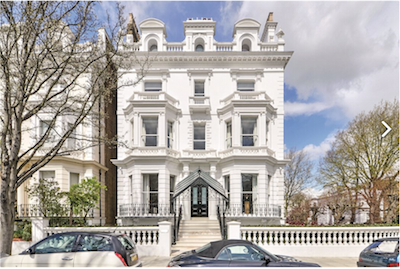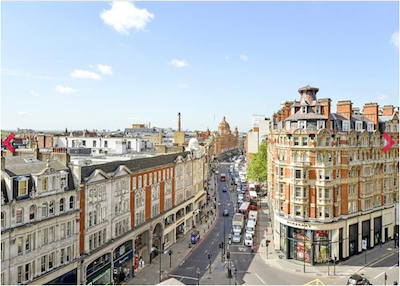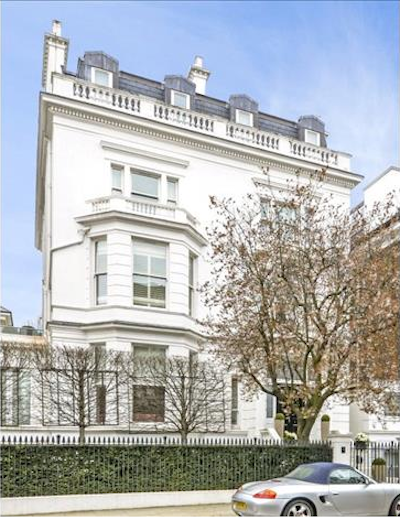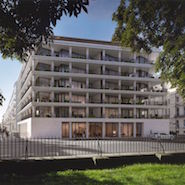Prime real estate prices continue to fall in London, with -1.5 percent growth in July, according to Knight Frank.
The number of prospective buyers contracted even more, down 6.2 percent over the same period, as the market continues to adjust to a four year run of rapid growth ending in 2013. Effects of increased stamp duty and the Brexit referendum are best seen in relation to this recent past rather than as independent agents.
"The current lettings market in prime central London is encouragingly stable," said Tim Hyatt, head of lettings at Knight Frank. "We saw a spike in new instructions in the aftermath of the referendum vote, although the number of new applicants registering is slightly down, creating an imbalance of supply and demand."
“From a transaction perspective, the level of new deals has remained strong," he said. "In particular, the number of corporate enquiries was encouragingly positive as it was dramatically up on last year, highlighting that confidence in London as a capital city of choice remains strong."
Stamped and sealed
While the decision to leave the European Union has led to short-term uncertainty and shaken up the real estate market, Knight Frank suggests that stamp duty has actually had a larger impact. Beginning in April 2016, second-home buyers have needed to pay a 3 percent surcharge on all purchases.
A 3 percent surcharge on a home already costing millions is substantial, but sellers were not always willing to discount asking prices as a result. Although the real price increased for buyers and led to, on average, asking for a 10 percent discount, sellers did not see why the cost should be transferred to them.

Notting Hill, London home via Knight Frank
Accordingly, the Brexit panic has actually led to a market correction. Uncertainty about the U.K. has led to that overdue reduction in asking prices.
Had the “remain” vote won, however, London may have seen a repeat of the aftermath of the 2015 general election – a mismatch in expectations and reality.
This price correction unfortunately occurs during the summer, when the local real estate market tends to slow. As a result, it remains to be seen whether price leveling will lead to higher sales volume or a more competitive marketplace.

One Hyde Park, London view
Both Belgravia and Knightsbridge are already seeing benefits, the former due to an effective 10 percent discount that dollar-pegged buyers have and the latter because rampant discounting has been tempered as properties are initially priced appropriately.
Prime rents have experienced a similar phenomenon, with overall rental values down 3.6 percent in the year to July. The referendum may have stilted registrations, but the number of companies that have abandoned pre-referendum plans to move to London has thus far been insignificant.

Upper Phillimore Gardens, Kensington, London
The longer-term economic impact of the triggering of Article 50, which would begin the U.K.’s withdrawal from the European Union, remains to be seen, as does the subsequent impact on the real estate market. However, debate still continues as to whether the government can trigger the article without parliamentary approval.
Market correction
While Brexit has led to a short-term market correction in high-end real estate, the forecast for other sectors still looks dark.
At first glance automaker stocks appear to have recovered following an initial plunge accompanying the Brexit referendum.
Tata Motors and BMW, the owners of Jaguar Land Rover and Rolls-Royce, respectively, both lost 11-12 percent of their stock value in the days following Brexit, but each has eclipsed its shareholder price from June 23, the day of the referendum. Despite stock market recovery, the trade impact of Brexit will send shockwaves through the automotive world, particularly for British brands, and possibly renew emphasis on Asian markets (see story).
Prime Central London real estate prices are falling, but buyers are still looking to the country, according to a report from The Buying Solution, Knight Frank’s independent buying consultancy.
“The Buying Solution Insight Report” shows growth had declined from 8.1 percent to -0.6 percent in the two years to June 2016, with sellers reducing prices by 10 percent or more to counter transaction costs, including recent stamp duty implementations. Nevertheless, value-minded consumers are diverging from the city center to find larger homes for lower prices (see story).
“Due to the imbalance of supply and demand, landlords need to be realistic when it comes to pricing in an increasingly competitive market," Mr. Hyatt said. "This includes considering price reductions, however significant, in order to reflect value in the current climate.”
{"ct":"Wa4UMzXjg9BwOo9+xlcp+UdatL\/y\/g6ylAXAb\/NCFfGHuHkd1nVcSM1niH6ztkZI7dkVgD1XBcyK30qAPnPvdCzJfUsb2SHrh1m+Fn8DsEsnjnp0ZmSGccCEuEliDwZUcmyKGa\/0fXoqlJabIDfJ3Lb7KMJSUJAY9C5IPWibcqAbaOAFu6G8vTj2zUtyij2zICaX+b2Fz64sITd\/AmKWzJh671pn12P89ipUNE2wmD1jXlVjm1C9JUAMVTr11MSlVS9H+tYGaLH5CHQerPbAadhSeS4GvJ0GqQl+0AL2bgOUSgqp2j\/TxLp02FGk5JdHDWTwQoTF6lt59\/J3z3mSA+37F\/nCWuBzReoQHyX8mQdIW+UVl81qigekcih9otd5uMT0+bstSeC8jyrtkKmJPL1ls9ySnv2e2p9WJw+vucx5Plc30guCf7Ziw80zhgoOkQtBciFgPbI9nQKGOfLQHih9dyuzZ4bY0PiOCl5LtfDhTur5cZOaBfh1lNd6GUd9DLR4zSUZy8y3pQZTlIQ6KgzqbsVzHHZt6YGuI1cmoBzdfqbb8Qlb2UiTYkw+I5VJ4IxQ2v7kZwvyv1BeuGYHGutva3JW8ObtJ+fDrf5y0Xm5TxO9VjtaVYoVz++7wwAGnWV9FCCEDteAthe8b5r9a0n\/uOppCHLWJ1wxua2RhS4Yz+ESc\/IGzSIcRTFQGqSVoUc8b+BFrDE1VwMf+vR2myeHtey4+iAc7\/eRqJwptEnqcNTSlw\/UQSFwov7TCWOf9TpZieEPpP9Z+BFNwXKzbBsLKxTavBWxC58Y9XCxQZJ9kRc68O3HgfbXZqc8VW2U4lmmgDb6YTqPgwkxBTEEZ+6qIa6QQ2DdEc6xoLaXoWCdFVUKX3caFX5UgyBBu\/i+ykTlR1pzncsxPRKmxSDOXmz0I50pA\/sIE1vuNPKQTdlmOEe9DUuTL4ura1DK1UR4VEM+E9sqyDMiuYMFmwtvJjHROX7xzAdSxX5LFCwTmy8swQMvZYr5E6sPWhmtSPwb+R5dhmHk9GiFP9HwCBz8LDDvOhuMk10WA\/C6kKCa2C7XzLv5mzXPRkmMXs4GEuyMubtGa5BpX4btKrzN24\/0QINLWNwjqdksmubasHoi2XjKH0YyUGWGVKSbpYuypdTW6cMWpufVAjX39nW11XMrUCbL9qQTwJLCzDfcaFnW152yRcmxPEE2IUA3T2\/lF+tU69CFiVKx73B+xOieBg3GB6qBO3ByUeUakQLJBBWa0NXAz7UMrwqOWqgAV509oN\/TyGgz3MEyHi9hLNjx3cV\/EVBXCID\/LeevphgZ0Zsj5hISBFsZYP2OxBdUt1JScD\/uxqzKwr8+z8bOiCt9OBlkVWc5mn41TFAIqOz+v4wzirB2qOiWHjNRF2byA6MwnLBN7tBqwlYF22ocrakbcFHqTahRDNtaBwaW9OPr+NpOvnXBAjFx\/TnN38ArP4+olB\/WTAfhuOxjeGX6\/oJoSAcB97rSMJ+\/b7S4hyGaS8MpWoCeqMVypUgjKZs4vVtvH0ERM1yIIgWsFr4wtPe5hZaVsV6s52HcCqPYxe9nzI7aEY05q2o3UkoVd+iUquVqaQYxQ19l13y35QOnKc84Lth59ggrlwqLh8zzXtfxz7VhhoKCKn4bctp\/61kujcLUTQdKnu18rJLPi4A2QTQS2Zz6cvMFg+DdpxZqr3JyBFeZNGyiDhzVO\/S1y1akPLVbYYahcOB2AHZ6+Ad9v+5mIlwDOr8m4WF90Tbeg9W8JonxtZI2hQKygyV4mYAIzAX\/jE4hrWEyub+I+dL7P2gId2eNVfhz+PxpZCy6nkViMspue\/xwVUWt0th+9ELA9NhjmGuPEr2TSxJ8dOnLLZjoIxSssHwoxxIKYP40IeBWq76zUVa1CDFvO0Q33wpLGjrz6rQTQCgWPiDlpdUKfWVao4bzlZmCAFDMUwYZd1VtyI\/zt0mvmc4COY8ZoJhYc48kVEJOzDB+HpkkKuDZG5f+CqFyG2BOI56NQi4E8J51Uyh7U0V6bBIRZN64rnHPefHv5ms0UFLFPhiZYJxuNdOFkHmv97TQvbFj8O\/Fht0QK8Ku\/S5kO7EII8b0gLWzMLFZG3S2pPhAStwU5oKc53pI+m8EX0K+EdrxwJS593oMbQRdJ0KfYICKAQkkvzXg9KRSnqi\/vZyE3KyrtrINpydZr8WJN5pmg7gRoc\/VD+TtBKkwISFx6SLa0P56zrcMO3CKDRtdhyOYVYSRS7xhF5FUqoF13LUns0uQYPOPbAVlcALKF6B9+wj\/73VtwGduKbvk1wF7yr9iikPLidBS1JMWJkSNTBXXbFly0Cmb69PXAGCvp3MmHgm9BmtvBamvIywNz26gU14bI65RNYI0HCOFr5\/73YChydPml69sUCbvUrvqA40OetCe54BO9v0ehhaSoS30ExT0lTgfZqBOsXXUF9YBb3Ti17g677e7T62A07kt+y\/uKWxBYPxf1woSJbazTLZYIwYQNaxUw\/NP7uLEBJMzZHoFubg5cwzgWxOLNxLWQth8aZboewnndhoczIwmBAFyu5oHWJs1JtW1q7KSItpew\/N+qnELq6azXUEZ7aLxr0UsN9b7dP0eGhU+yUbT6kPIEDE3Dwg++NiC4Id1Vt6KLS799hy7ZLvxwHqZWAgy5XjvssRBAEtkW7oeE1xJTfmx7Jt6Sn87CDDf6uNgDujphGpmtLQc+i6x0erb\/\/7OVSmr4Acv7NNqWq8G28iUQl6GuNoexze64MH29DfvmccDi0uiGYi5gptAPeI1dmq3s3Ug+zg3HEHDbDtToRtp2n5f1pCqkyLzlifUAdMyawMAhmtk11+y\/GZY2MIhL+EduzHQOO5PJmlUa8NOvFsGCKZk9JX1MUmUJJ5PaibxPe9MT0+88JlssasnRTY3GNPFRjrHOQpIh6rLWCLwFJ3H15vsUA\/W5yBkbsSanbmHIz+8IF9S18sbcL+bSZHR+o\/IlZVQiGlz32m7d6CVLy5gDOQm7Lq5FsRYt4HGKwUdh6KslH9kGco580MBJtwMUuiq4Iv9\/ErY3QWcSTt+DXnQfVL2Wbkbp0XKNkWBuxilNsNTvYHOl1AdkC8L1p4zdzXbuV\/wxhjxY+UTkRZ6pBA5GTIulAQpsDHZLUA2QI1US8c3ePmfVfEFNPQ8gclcIDQ8Z7hjwSzpzHhRUxCgc2aQMqqOhI2SoetyWEY+H8I2fbKZX+iefet3smEBLqCPQovtF5t0ntXicUaMHpwPBldQCrWTclUYqCdaRExJg8+B\/HRSpeyNCUsxd22olHXxli\/mwn452AkanASsdNpiViNQY+a2LDyWGSCYJDiEFBh1B1u+FtusKa3eWSW2uvOIF7erz9zZGUBRPMRN7d4oJ8kDDxQL8aZz2hWnuH11TKWRn+1vvzVYDBYLjbX5+kmXP90UYwEYxVV0mPv6Sler0ko5vsrGx6+m0hWhmf9u9DWIt8F9O4Jcsuaws0z+hYKZzMjkT5Uir2Xywb47\/WClOltJlLqB+RgaevWVTYxePAy2d6mmYc1g+3MCpUmJ0ouQxTUmdyjvjgZZ2nShbxat7al8pieMRPOChPfFBwRPd8dPvNX2+1E2qIIoNwEbB++W5oBVp1r\/lFy0wsi+Q\/BqXgA\/AxUfJAHeOSZt62EdRx6RjmGSTp0aSNWtA4rIsucdugBrrwpfJSc4Yzd\/TYhEuXluuqZiomImf3rgp1Ni8MdbUKcXxVhcpqNXEEAva\/sRm218U4slUkJBCcAUa1bniY6SrT\/MyVJLMHdXarlqFNHPA+Z8Q+wC+VCs+MySdwAmed7lOutKh13IbT2wfzi69ZjWMcmp9Wf5AXRWM9RbxAv4CuI0DYp\/w2p0Kn+r4FCfgBVWOiChJiKIyyRC7cZ4cmSkKx4Mj0QXY483EoYLcZEJbgtC2gCeyDfWNv+D8tmOKj\/3CL\/+w4Ybr5NRZ0h0sX866AbViHuV5R0\/ALdiN0b2GxfZ50deyHx\/gNYivy8C67oJpuO+QBEd4luM5nkrVAXAPVy1B02cR789\/rCzVfxv61Iqtx9yZFRUApqt0UDuG1uLJN9Qy5G+PU93hETH2C62spaCpNsQsUBJpayvh9GmTadLhTSuyzBU\/q8l3W15aKp0xnGz7ffrMtgLIuoQVzERQjA1agk0ZRNdKMRBKtdnie5\/ISv811rf1nts5OeizQfJZjq7C1kdDzOlh2Y85BkPerHp8NptqcISE7iHcaK7Xa\/Te9kOgm2T\/0yKim8cgDMVk3YiwcRHdnC6h+GoHhEB4EHMCvEyeymMbotRul+ZSWSJlI4QleBvURZjYoGN6pHx3wMClRIqPNrtauDR4a30jrb7zwitZ\/DOm\/borxq2QbR+I2JzWAEFeuUuJEwtMacVmCK0DvbFPbmZGufu2\/f132Il7q3n7ZAow\/sMrfwv6ji4ioj\/h3pmqL5KPPt1\/gFRR1TzH\/flY7JC0JFQfRts0br0ICcrbOXirHkrf+v1GdKf+x90AMVMY5wfquuG4dryjpLa15ZUlWW809w126hbvSak2dd8G9a4GHw5WaU6oqhqAF8P3mBCtBRx4ZhiTWv6dLSveQ836D5D+2GGQhwHZsaEVsxWc6ITFIjzF2bw83\/f\/NNN\/vC1UomiNdzZjDfjKrfbzXapdgMrkA3gfENrBpi3yh1xekCrZTXRtOyeqwo6RQ4QiBl4p82NmkMChCSdjmr5he+RTzpv1ObD29gV2QhzEsP\/\/mLChGaoQl0yiInd1W7xZk8G6YJdxYRUlxQjeXGHAkvcbmOEiJVDqrsqEx6YAoi\/tYUjiUXc9Bs3J5yjr3xXa2OYl4LCGaTYlV+vo6LTRnJ0eygilzdn03Oxt82WCZW9yyprf\/du0\/7G4KpckG5MkgZGkeXjDWTnkIEI5LNYD0Cf9PiSf32Tw8UJNZduJehfI5J0R7vCK\/7OAJHgKub7LBMugZBPtBfHsm7w1Nf+SIXlUtf3ud6KAkCobgwiYs3pl+1OdpDgGW5dJ8nY92eD2dec6y5PhI4tgB2do5kjym\/LndQArVtiCoCz0GfGCq2ebFF56bzDjOafT4MaXaO016JrJFIv7uKpHUwUHpq65aFRpntzzvdBfDDAURUUr+8vZ+IjrPBeg2w3IGyO+AFWGzKKa+tlIvGDqzLggImUm9FeDEk5phytWXEeSxf9Y+7c7vAQLj8ermcILDCx3fwZTQ\/OOLuoRkYUZT4Vr+36UWKt41LTkaEuuQ\/t4CQw8MCC1AY\/r\/weN+bf3RQKkZQbWt+wKueBSYHiXzkBTAnN7rlp14jUrCXzZq6Zy4D3\/D1Mb9iVTkwv+0Lj6rMCBQuoqpZB22WBunZWCnbK6Mma9cQssTNz\/ZN7uqKyQJCbxa56G0RDCFMxLLlAaoWelq7Yk3GhwmGU03udJPZaq5wdiI1QG6Xdr4+YM1uDcnX2hiWuVTRQCcNH3kr8S9P7wvyk98JZMpZUf\/aFdnGUh2FqfXsN84ex2M3En7+oqdI6TcjGOxCUyO07uebUgESVPQoizZN06ok0tnbFsRI05kwplWRWHIh34r0oMqFfLrTDnF52AcNwrl3mjgNUsBnK9I6F\/VAnCzcFL5RPo2DbFwKDZZM+CEBAy9C6mA0IHiZrgfswJO\/nT++rBLz0I109c9igll0zzOzo9sfpMjk0voGz49VuXzFBU54b3AaPTBeHD1zXhgw3dz0XHMT8QXH2d1sr8n1PQSIqKN4kuQaprOfE+v0WsRdU0fpPyPp\/KyIFTqnghMCcEyeIUNHdvwmHLjQpLOLw7+qe8CvhdN3XD4IqPmPT\/7yFsy\/spxDr39oCsQ2338szFj6J6XHfEq\/TQFO9FD3rQZn5SOzzPikg3W3KTE\/uPxCQ84Ec\/qjAJS7MaHtbVJhlWEbjGeTdCoaKF\/aiq+e8gtiwEXQDh5OhsQVDvDxeEsd4+PWcoJ2xLpyAiyBi5HSAiM257++xGLR2CmGo2+peAHrmeypVmUVTHOGNUk3bBylrUzFeGZG6qMu\/wFlGS92t2Zq+lpb1MrqMLhEP\/6c3PZ4fBg+onhnQs5a0sgHxDP5Qi7Vq82uRlDNNCHi0tFtRqbaJFFruf2autwahOz0ybVPxMTxPQ6WDSIf7yKBT9DNYT1lJFahKOSmyT2WT45qs1oP2BCBdf3irwi9tpH\/vdz6XX1o7nStMvGPFGgadnWH3m\/B+7UgUDIquGq1smtFKGQa1IoH0Ujmv23Is4rcVxT2s2a9wYlFKgFoQlgwbQm49UdSM142y95bFSbnHRNwXYe39lm41kN1FTEWRMq3RrPHC3Yl5mh65o9WfK+yKqRlgcw4q\/gPujluBATsPpPYgBi\/rwgC+Ac7xUHaAPC\/QgxF0U7p+Pu2Y\/4b5ht5UE\/bEGhjoyH1OhDsW2Ead66khrZSqJXq1e6iVJXEPxvczzaJsXtEhFLfDGlFsFUSj76mIE+NoDwiGL5MzIPwUhmxZ6SrJ+bJN6cpj2T\/ipW6+c1Lzfk2KD+AKlyyr2jRWe+PGpibZu2vflbaC8CzX8tLCYI26VCqiP5hAgbDQosagIKV82Bm1NUceK\/rL\/92epKwAwMN2H9Zy63S33HnYluTgOqws8LNkwIosQjPmKPChyTMkUt2jY2vZpWqfA\/U+KOGTDZC3w7MiACZYs67ZYGtmRMwG491yjYxdeBlwkXU4dM7S2wvTj1DZrt2f4wyN4j5boDTjXvfxI4k9DhKAmaZ\/uYgsTFhrLFdxgM8jSHV6zTaug5D41vL4G4yR20kbt92pdULsQ\/+SuGiiZnY40C\/5wAyFqzD6MmIDkW2JPur6VCPIerF2wnRTW3OGz3GPfQGAkTt0IkEgfqeDcQgWgbvsMIdZAkTMyWB6kdsbxUTIgv+lDzdbOdY2CZx1cQSuzDaS1y5aVoD9pzjSvdyWpprz77hMSNx2hIUqv2Nn+YKRVmbfaEGYO89M3LWDwommFYfUnE9pa33cafl5hEJ6pCjtyxGYH6lN7rM1G18KLiPNRWZaTgmpQdD48LHQyurKV6I4Yjyoxjk3sYu84+HZhn8wQ6HJYmhg1g771n0jCL60Ak5LhP0sQJJ2sTO9lDCLFMP2DBW47sWmy6E5j5rlFcqk7WxjVdmOp2U\/CYfxgL2xbfNUCTNrpUI9whJMsn7D0lAtmF1ZCeyoW9We4x\/+8649M4PaWDffhpGE1X1u403l7\/iJjvhdQHJ1Gnrlyx0Iva3VNpkpwjCldCNXELpE1wNb3k1r75Rg9O9aRyUdAx3XrM6y+hHqLk3b5VvR5eDyTLAoSc9geTbOBWMhjgdffXJ\/m\/H1SHZ82hxG1ydgNqCu5MAyBcMvAzND1j96mjoA5DVq7337NCoDBxfJE0kgXP6qj75zDNITSDGw+Ej1Ups\/zrLDI5nPJadwwtp8C78cjCxmYC+x00XbebE6Aho2AU+lbwlOlltvudQJtclFcQLKJZApFoZEuAG8b0s65FYu3hNIQLplCQGrIgDRFiDlPsobJ150gzdsjw3ynCAViakTmGlcUd6oMgHPg0WpwUN9GUein1PltPhBkX1zx4haaPfr7RXA6xaFLrqlD01HY8tg8m0vXwhFRuq3lgBNj0Xez6PTBpiojUtuox7Nc41FY0mkCy0MYAHbz\/FmfzN4rwAp63rFgyb5jg\/hCaJgqmcW\/3WMdeii+3sT8HjKel48SpTAC8GIFKFgs1Emb3OSOgYCv+uRVuM92EPUbRwHwEhgTqHQ33\/zCnieOaDcy1Wy1ThWHTLgjYRk5OHb1LzpEpcYR6YBCJ5KtT1CkPJM8ggnkhn6vhpM7w+\/A6+IUMOtzvcL86iYhnhGJkn\/XOnD2Feqyuqz7UyUz3QoPNw1KZX2sc60\/kZhx7gtnaPubc5gGKywsazv3b4pWJ0c+xA+XKTL9kVFKQ8hubzJ42e5e8SYj9fK6QOH+50Xoqtgn4H3gGZm59Ilm6IXFIaYpAMCzaN0XwiwB9\/L5nLlAzH404TAh2c3hNxs3mK6eeAdHRQxkAMMJgH5dsW8y1U\/LMaYskXedNdWWEqhTnnptpUzphJnVlw0NaEYuvSp2K97u0XpP7Wkz5gIp\/jgda1JgGP+uSidupwlHrhQp1kzESbeP\/Ymw2cIovc7P4OxcyFSAxifliMc1qjgdbH8\/Q09Qq0fdYNORkFvVgut6ilJYFSuw4KCVn\/C\/LnKAe9iyBAt4eJpLwt4FwY4gX32uc8YRBgtW7JSKA58RYferE4S8EdR2le8640B\/W9KsToRyavdR4YIyKlZFl\/25wgl9IgYODHzEh6ALPJy27wVUdkf9PtsbvN2WWUMExhKvOSS\/ci5CTsuF0GLG1e2aD5gh8Nx++behUENV5AsODVQ0pW9X7bNT2z6B1I4sIjHfc9f\/dVOngBXkQm+RwdXjo\/T4tvDXSLrBWRbA+T714CbOhwcz5QnoEI83QjxlY\/qKhLUo9cwWlBRXKqW1R5mZ7fpiyovfZJ2xNoSYi\/Bf7LqkibfNQTmAb5FHKNQn4xi0PkNeSTSJIvXOo0BpKrCsIAuShCWgNvEG6WYwdxXcun\/lCpxaWd3l0WuR0irdW2xXM\/tbD8kixT5ODpjZwtX2uoGucZ8yLnx0fRvwI3gCAZ2bE1CHwR3cRwQCuLWox8R\/BKVA5lTKea1LSjqIrRk53kGbxXfZkVy\/MyqNNA5CsjWed8lEVZFWW9OtiRILEUP8GHVcabrddXCqBKtbt9TvM0z3mbchPy\/ptdfj0IZC5VO+lSYjyNiwt1dp2ZE1xcgaXcyjNR31Ava3mTIGG7tYy6IjZWQXLfwLyNOJcnMneo7xsVa6o4bIQioM3VSsrQIEhT0SvjXnCKQhOED1wKLz+yF1p\/bswUBpdBotrhsyDH8I8ldof7DgQ070YGDmJNFEwRjQZq2erFWF1X\/q40idCQVJcdHBNXIkyXz+ELAP3+Y4Nn0EzDBM6t3U7YZDdE62+vhNnqmCpD4B6im25INzGHeSCLeNgLT6nbcuDPSTDry43MCufxXWAGNYBzD\/R7yLVqE8vZZ","iv":"2eccd99735e82e1566d72a30c41ca55f","s":"db0fd15bb9f0c97b"}

 One Kensington Gardens, London Knight Frank listing
One Kensington Gardens, London Knight Frank listing